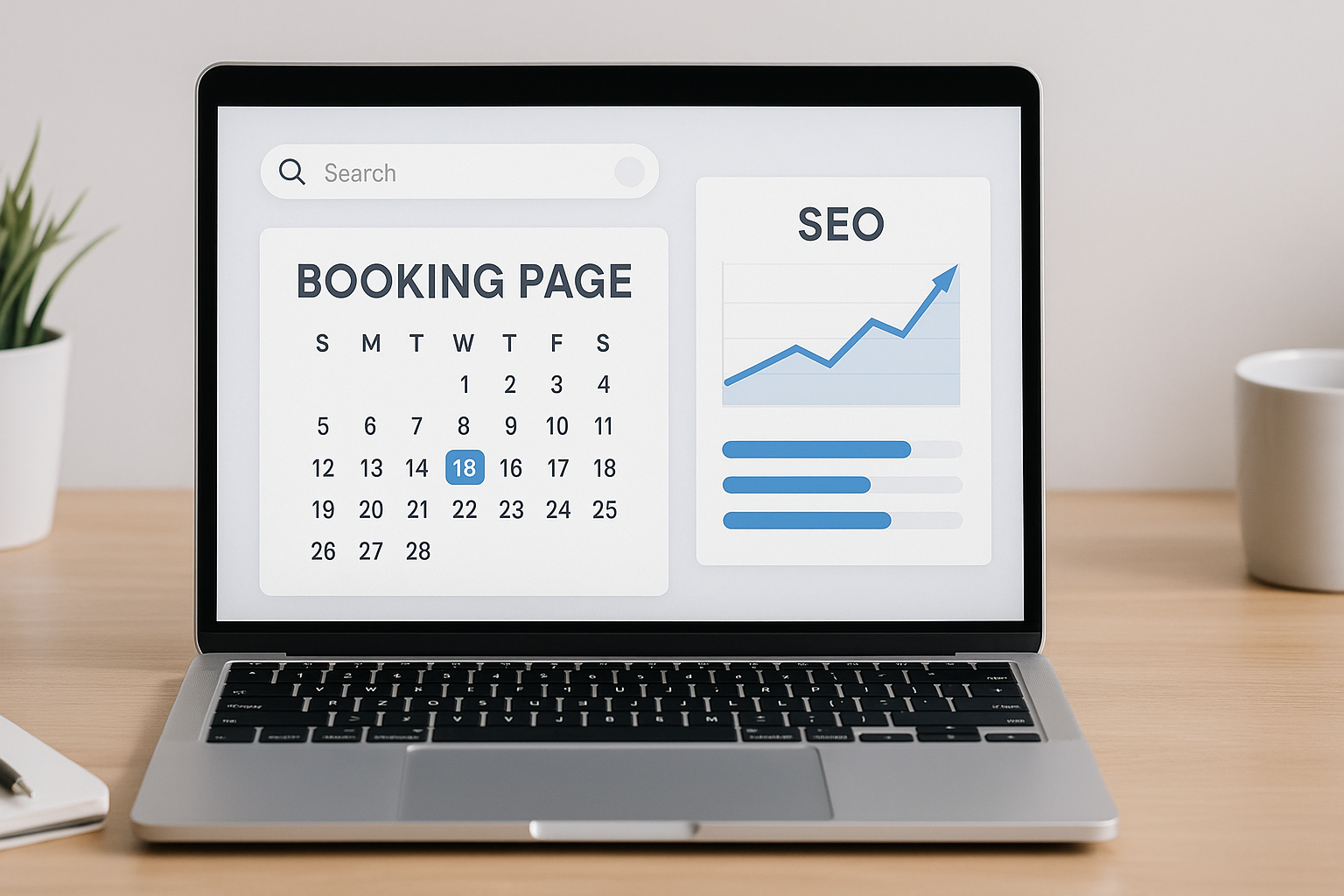Have a booking page, but not getting as many customers as you expected? That could be because your page doesn’t rank well in search engines. If it did, the traffic on your site would be much higher, and you’d immediately see it by the rising number of bookings made.
With the right booking page SEO strategies, you can boost your booking page’s visibility and attract more people ready to book.
Curious to know how? Read on, and we’ll show you everything every booking site owner or administrator should know and implement to rank well in search results and get high-quality leads.
How Booking Pages Differ from Standard Web Pages in SEO
Booking pages work a bit differently from regular pages. That’s because on a normal page, you need to warm people up. On the booking page, they arrive already warm. Your job is to remove friction, not add persuasion loops.
This is where SEO for booking pages comes in. You don’t need long essays; you need easy-to-grasp information and structured, scannable facts. It helps to think in terms of a “decision snapshot” instead of “story.”
More importantly, search engines should be able to easily read (crawl) your website. If availability or pricing is only in an image, you’ve hidden your best signals. Images should only complement, but not substitute your textual information.
Here are the main differences to keep in mind:
- Intent is transactional: Users want to book now, not browse.
- Less text, more clarity: Keep copy short but specific.
- Surface essentials: Show price, dates, and slots early.
- Booking schema: Mark up offers, reviews, and business data.
- Distinct roles: Service page explains; booking page converts.
- Proof nearby: Ratings and recent reviews above the fold.
Every textual, graphic, and navigation element on a booking page must emit simplicity and a clear call to action.
📌 Example. Let’s take the subtle connection between external and internal linking. Ideally, they must create synergy and work like a funnel.
You channel organic traffic from blogs into your service pages, and from there straight into the booking page, nurturing qualified leads instead of random visitors. The clearer the path, the stronger your organic performance.
Keyword Research for Booking Pages
Unlike ordinary web pages that mostly aim to inform and educate visitors, booking pages focus on a transactional user intent. Users come here already “warm”, i.e., ready to take action, book, schedule or reserve.
It means that keywords for booking pages must also reflect urgency and aid the decision-making process.
Luckily, there are plenty of booking pages out there, and some of them can be your direct competitors. Analyze their keyword performance with specialized SEO tools like SEMrush and Ahrefs. Notice which keywords they are using and how they perform in search engines.
Note these key differences of your booking page’s keyword research from the standard one:
- Transactional over informational: Instead of “best yoga studios in Chicago,” a booking page works better with “book yoga class Chicago.”
- Local focus: Many booking searches are tied to location, like “dentist appointment near me” or “book a hotel in Paris.”
- Service + action words: Phrases like “reserve,” “schedule,” “appointment,” and “book online” matter more here than “how to” or “benefits of.”
The following practical steps will help you get going and stay ahead of your rivals:
- Start with core service keywords: What exactly are people booking? (“massage,” “hotel,” “table,” “tour”).
- Add action modifiers: Layer verbs like “book,” “reserve,” “schedule,” or “appointment.”
- Include local terms: Add city, neighborhood, or “near me.”
- Check SERPs for intent: Make sure the top results are booking or reservation pages, not just guides.
- Balance volume with intent: A lower-volume keyword like “book same-day haircut Boston” may bring fewer visitors, but they’ll be much closer to conversion.
📌 Example
Blog keyword: “benefits of massage therapy” → informational.
Booking keyword: “book deep tissue massage NYC” → transactional, perfect for a booking page.
Linking Strategies: External & Internal
Links in SEO help drive authority up, build visibility, and improve search engine ranking. They are the “wormholes”, the shortcuts that connect one’s pages with the hundreds and thousands of other pages on the web.
Likewise, internal links help users find what they need faster, increasing their dwell time and improving the chances for conversion. They also aid search engine bots or crawlers in indexing and ranking a website higher in SERPs (Search Engine Results Pages).
For booking pages, links do double duty: they raise trust and point people straight to the action. Prioritize a simple path from discovery pages to the booking page, and build relevant external mentions that reinforce location and service fit.
If you want the highest return from your booking pages’ links, do your link-building strategically and transparently, following the best search engine practices.
Save these quick linking tips, each of which will strengthen your path toward building an SEO-optimized booking page:
- Link service pages to the booking page with clear anchors.
- Add “Book now” links on location pages, near address details.
- From blog posts, add contextual “book” links near proof.
- Use reputable local directories for consistent citations.
- Use breadcrumbs to show hierarchy and aid the crawling process.
- Start marketing and partner with associations for relevant, editorial mentions.
- Create one primary CTA in navigation; avoid competing buttons.
Long-term results come from white hat backlinks, carefully purchased while following Google’s guidelines. These stipulate a natural link-building strategy via quality content, instead of resorting to manipulative practices, and prioritizing links that come from relevant, trusted, and authoritative sites.
📌 Example 1
Service page link: “Our spa services” → links internally to “Book massage appointment”.
📌 Example 2
Blog post: “Top 5 hiking tours in Colorado” → includes contextual anchor “book your hiking tour here” pointing to the booking page.
On-Page SEO Basics
On-page SEO is about everything you do on your page to optimize for search engines. Contrary to the traditional belief, it isn’t about stuffing keywords. Not in 2025 and beyond. It’s about helping the right visitor recognize the right page in seconds. For booking pages, that means intent, clarity, and speed.
Everything starts with what users see and read first — titles and headings. Write your title tag like a label, not a tagline. The H1 should echo the main query and specify the location when relevant. Use the first block of copy to set expectations, i.e., what’s included and how the booking works on your website.
Save and refer to this quick on-page list when editing next time:
- Make sure you always have an intent-matched title and H1.
- A short meta must set expectations outright.
- In navigation and design, practice minimalism, e.g., one CTA; avoid competing buttons.
- Always keep reviews & testimonials near the top; limit their number.
- Images must be understandable to search crawlers, i.e., contain descriptive image filenames and alt texts.
- Make sure you have internal links from service/location pages.
- Add clear cancellation and contact info.
Think of on-page SEO as helping search engines and visitors agree on what your page does. For a booking page, that job is to confirm fit and make the next step effortless. Everything else should support that.
Call tracking is often used to support on-page SEO for local businesses, providing insights into conversion patterns. That data helps you understand which geographic regions and which queries yield more conversions, and you can optimize your page accordingly.
Mobile-First Design & Page Speed Optimization
It’s not a secret to anyone that mobile internet users constitute the majority of all users. This tendency has been increasing with the spread of fast 4G and now 5G mobile coverage.
What does it mean for your booking page SEO? Optimization for mobile devices must be a priority. So, start by designing for the smallest screen first, then scale up.
Mobile-first removes clutter, clarifies the path to “Book,” and cuts the assets that slow pages down. That directly supports booking page SEO because fast, focused pages rank and convert better.
Treat your hero as a decision block. Show the service, location, core proof, and one clear CTA. Keep forms short, with sensible defaults and mobile-friendly inputs.
Use this quick list while editing:
- Large tap targets; no tiny links.
- Use built-in phone selectors for date, time, and guest numbers.
- Opt for modern image formats (WebP/AVIF) to reduce file sizes.
- Delay loading or delete JavaScript that isn’t critical.
- Limit third-party tags and chat widgets.
- Clear, readable fonts and spacing.
Speed is mostly about loading less and loading smarter. Compress images, defer scripts that can wait, and send only what the first screen needs. If your widget is heavy, show a fast summary first, then load the widget.
Remember the goal: a smooth path from visit to booking. If a thumb can do the job without zooming, you’re close. Keep trimming anything that delays the first interaction.
📌 Example
A local gym can significantly boost and make mobile reservations seamless just by simplifying its booking page to one clear CTA and larger buttons. That’s because its primary target audience is youth, who are accustomed to planning their leisure activities via mobile phones.
Content Optimization
Last but not least is the content optimization on your booking page. A normal booking page may not have as much content as an average webpage, whose intent is informational or educational, but it doesn’t make its content any less important.
On the contrary, the scarcity of content on a booking page makes every single word and sentence count. Clear and succinct content helps search engines understand context, lifting your booking page’s visibility.
So, lead with a clear headline that mirrors the search intent. Use the hero to answer basics fast: what’s included, how long it takes, and a simple price cue or range. A short sentence about availability or turnaround time is fine, as long as it streamlines people’s decision-making.
Write in plain language and a helpful tone of voice. One line about cancellations, accessibility, or parking will be more appreciated than a couple of paragraphs with unnecessary excuses and explanations.
Some booking page owners make the mistake of intentionally beautifying their copy, trying to look original and not like every other booking page in their niche. Please don’t make this mistake, and refrain from clever phrasing that hides what you actually offer.
The Bottom Line
A booking page needs SEO as much as any other webpage. Even more so, because with limited content, every word and element carries extra weight.
The accent must be made on mobile optimization, simple navigation, compelling and concise CTAs, and smart external and internal linking strategies.
Content-wise, everything must perfectly fit a transactional user intent, as most visitors that come to your booking page are the so-called “warm” leads, since they arrive already motivated to take action, expecting clear details and an effortless path to complete their booking. Show them that path and simplify their decision-making.
A staggering 80% of SEO success can be achieved just by optimizing the on-page SEO basics. These include clear headlines, descriptive and keyword-rich meta titles and descriptions, images with accurate alt text, and compelling user reviews shown above the fold.
When finished, double-check for clarity and trim mercilessly anything that doesn’t bring value or simplify decision-making for your booking page SEO.
As Antoine de Saint-Exupéry once put it, “Perfection is achieved, not when there is nothing more to add, but when there is nothing left to take away.”






